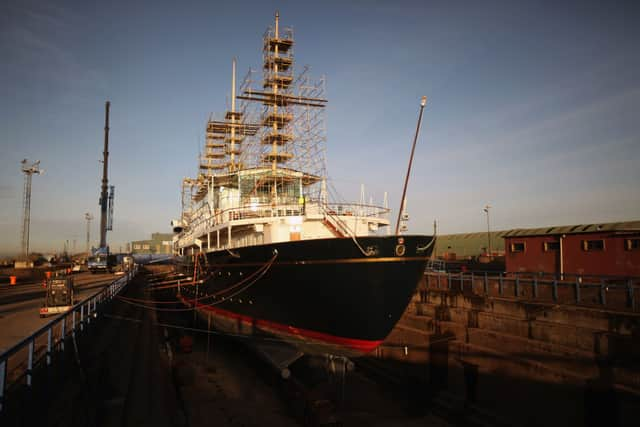UK flagship yacht: what is happening with royal ship commissioned by Boris Johnson - have plans been shelved?
and live on Freeview channel 276
One of the many controversial plans announced by Boris Johnson during his time as prime minister was the creation of a new national flagship.
This was intended to replace the Royal Yacht Britannia, which was decommissioned in 1997. Expected to set sail in 2025, it was going to be used as a “working trade ship”, meaning it would host trade fairs, ministerial summits and diplomatic talks in an attempt to build the UK’s international links and boost exports.
Advertisement
Hide AdAdvertisement
Hide AdJohnson said the flagship, which was going to be named after the late Prince Philip, would represent the UK’s “burgeoning status as a great, independent maritime trading nation” after Brexit. Meanwhile, the project’s strategy report described it as “a visible demonstration of the UK’s commitment to enhance and strengthen trade with our key export markets around the world.”
Despite the royal yacht’s trade purposes however, it was going to be paid for out of the defence spending budget. Estimates reported that it would cost around £200 million.
However, the contentious plan has now been scrapped - according to Defence Secretary Ben Wallace. Here’s what’s been said, and what the reaction has been.


Why has the royal yacht been scrapped?
Wallace announced in the House of Commons on Monday (7 November) that he had cancelled the building of the new ship, telling MPs that he was instead prioritising the procurement of the Multi-Role Ocean Surveillance Ship (MROSS).
Advertisement
Hide AdAdvertisement
Hide AdHe commented: “In the face of Russia’s illegal and unprovoked invasion of Ukraine and Putin’s reckless disregard of international arrangements designed to keep world order, it is right that we prioritise delivering capabilities which safeguard our national infrastructure.” He also said the MROSS would “protect sensitive defence infrastructure and civil infrastructure” and “improve our ability to detect threats to the seabed and cables”.
The cancellation comes ahead of the government’s autumn budget statement, due on 17 November, in which Prime Minister Rishi Sunak and Chancellor of the Exchequer Jeremy Hunt are expected to announce a series of spending cuts in an attempt to fill the £60 billion black hole in public finances.
The Defence Secretary added that he would be holding talks with the Prime Minister and Chancellor in the coming weeks to help secure funding to “protect our armed forces and our current plans from inflation” in the new budget.
What has the reaction been?
When Johnson announced the multi-million pound project in May 2021, many MPs and peers criticised its value for money - especially considering it came just after the coronavirus pandemic had dangerously stretched government finances and allocations for public spending.
Advertisement
Hide AdAdvertisement
Hide AdThe Commons Defence Committee warned last year for instance that there was “no evidence of the advantage to the Royal Navy of acquiring the national flagship,” arguing that the price tag, as well as the projected running costs, would add to the pressure on the service.
As a consequence, many MPs have welcomed the confirmation of its cancellation. Labour’s John Healey, the shadow defence secretary, praised the shelving of the “previous prime minister’s vanity project” as well as the fact that spending was being given to “purposes that will help defend the country”.
Meanwhile, Sunak’s official spokesperson acknowledged that a Whitehall spending squeeze had contributed to the decision, saying the Prime Minister “thinks it is right to prioritise at a time when difficult spending decisions need to be made” and “finances are tight”.
John Wood, chief executive of Harland & Wolff, one of the ship’s bidders, said: “We are proud that the design our team produced was one of the two finalists in a prestigious programme, which would have been a global showcase of the very best of British shipbuilding and engineering and is testament to the skills that exist within Harland & Wolff and our partners.” He then added however: “Obviously the decision to suspend the process is disappointing, but we understand the rationale for doing so, considering the current macro-economic environment and the ongoing situation in Ukraine.”
Advertisement
Hide AdAdvertisement
Hide AdRear Admiral Rex Cox, CEO of the National Shipbuilding Office, said: “The National Flagship project showcased the talent of the UK’s maritime industry and I am grateful to all those bidders who took part.”
Comment Guidelines
National World encourages reader discussion on our stories. User feedback, insights and back-and-forth exchanges add a rich layer of context to reporting. Please review our Community Guidelines before commenting.
